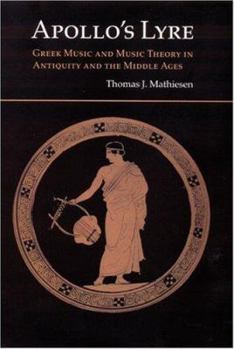Apollo's Lyre: Greek Music and Music Theory in Antiquity and the Middle Ages
Ancient Greek music and music theory has fascinated scholars for centuries not only because of its intrinsic interest as a part of ancient Greek culture but also because the Greeks grand concept of music has continued to stimulate musical imaginations to the present day. Unlike earlier treatments of the subject, "Apollo s Lyre" is aimedprincipally at the reader interested in the musical typologies, the musical instruments, and especially the historical development of music theory and its transmission through the Middle Ages.The basic method and scope of the study are set out in a preliminary chapter, followed by two chapters concentrating on the role of music in Greek society, musical typology, organology, and performance practice. The next chapters are devoted to the music theory itself, as it developed in three stages: in the treatises of Aristoxenus and the Sectio canonis; during the period of revival in the second century C.E.; and in late antiquity. Each theorist and treatise is considered separately but always within the context of the emerging traditions. The theory provides a remarkably complete and coherent system for explaining and analyzing musical phenomena, and a great deal of its conceptual framework, as well as much of its terminology, was borrowed and adapted by medieval Latin, Byzantine, and Arabic music theorists, a legacy reviewed in the final chapter. Transcriptions and analyses of some of the more complete pieces of Greek music preserved on papyrus or stone, or in manuscript, are integrated with a consideration of the musicopoetic types themselves. The book concludes with a comprehensive bibliography for the field, updating and expanding the author s earlier "Bibliography of Sources for the Study of Ancient Greek Music.""
Format:Hardcover
Language:English
ISBN:0803230796
ISBN13:9780803230798
Release Date:January 2000
Publisher:University of Nebraska Press
Length:807 Pages
Weight:2.63 lbs.
Dimensions:1.9" x 6.2" x 9.4"
Customer Reviews
0 rating





